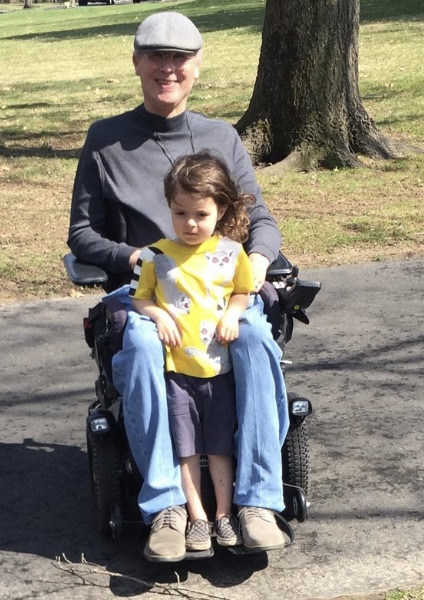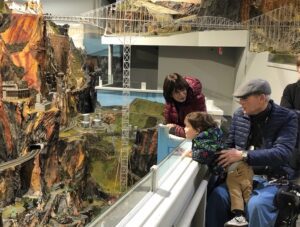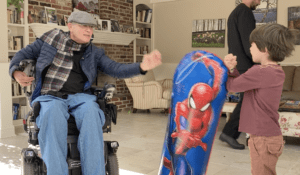Editors note: Earlier in March, the New York Times ran a story that mentioned the Good Grandpa blog. I really didn’t know what to expect before the story ran. When you start a blog like this, it’s a lot like talking in an empty room. If you stick with it, eventually more people enter the room and join the conversation. With the Times piece, a lot of people joined the conversation all at once. This has been both wonderful and humbling. After 9 years as a grandpa I discovered how little I really knew about the wide range of different life experiences that other grandfathers live on a daily basis. My own life is one tiny sliver of a vast galaxy that is still unfolding. The guest story I’m posting here, submitted by a grandfather in Pennsylvania, will illuminate this galaxy with a level of persevering love I could only aspire to. I hope that after you read what Dr. Lipes has shared you will take a minute to post a comment and answer the question he’s asked in the title of his story.
Can an ill Grandpa be a Good Grandpa?
By Jan Lipes, MD
It’s not difficult at all to read stories about the “good” grandfathers. Or hear such stories told at the dinner table, at family gatherings or on the benches in the park. Good grandfathers abound everywhere.
These legions of seasoned warriors think of grandparenting as the best job they ever had; they keep pinching themselves to make sure it’s not all some kind of fantastic dream. They are astounded to see the world through eyes that have only been inspecting it for three or four years.
Grandpas are touched, they are invigorated by eyes that regard them as fountains of wisdom. They can’t wait to descend to the floor with their little colleagues, down to the railroad tracks on which little gaily painted locomotives and dining cars circle endlessly in an infinite loop that simultaneously goes nowhere and everywhere. They love the rough and tumble of tossing a little body through space at the swimming pool or at the beach and catching it in a grand gesture.
Grandpas can’t wait to be over-generous in gift giving and consider it one of their main jobs to spoil their grandchildren by granting them every wish under the sun. They positively jump at the chance to babysit. The miraculous opportunity opens up before them in which they themselves have the chance to be children once again, to see the world anew through the eyes of little ones.These stories, told by the able-bodied, the inhabitants of the domain of the well, are inspiring to read.
But what about the stories of those grandfathers who don’t dwell in the “kingdom of the well,” but rather inhabit “the kingdom of the sick,” as Susan Sontag proposed. What of us?
Yes, I am a subject of that latter kingdom. My entrance fee was a pair of legs that won’t walk for me, necessitating a wheelchair for thirty plus years, and a formerly dominant right arm that became non-functional. What of me, and those like me? Unable to indulge in those joyful interactions with my grandchildren that the “well” dwellers do, how can I experience the joy and wonder of my grandchildren?
Well, fellow Grandpas, there’s good news.
If you’re looking for some fun and meaningful things to do with your grandkids and you’re as disabled as I am, remember the Japanese saying; every defect has a hidden treasure. So how do we, the ill, find this hidden treasure? As with most issues in a disabled life, adaptation is the key to the treasure hunt. Adaptation not only ensures the survival of the species, it ensures our survival in the face of daunting challenges.
Kids love rides in amusement parks. If you’re living the wheelchair life like me, consider yourself lucky as you needn’t drive all the way to Coney Island for the rides; you are the ride! Kids love it when they can hitch a lift on your lap or hang onto the back of your chair while all of you go speeding down the road shouting some nonsense at the top of your lungs.
Kids love checkers, cards, blocks, silly putty, pick up sticks and all manner of table games. Can’t hold a deck of cards in your hand? Adapt by getting a simple card holder. There are all sorts of simple gadgets like that which enable you to manipulate the baubles that kids love.
Museums of all kinds—from aquariums to art institutions—are great for touring with a kid on your lap. Your little wheelchair cabal offers a great opportunity for intimate chats about the things you encounter. And an added benefit is when your grandchild gets “tired.” You now adapt by becoming an Uber driver!
Picasso said all children are artistic geniuses until they reach the age of seven. Well, you don’t have to stop there. Art is endlessly varied both in the finished product and the methods by which to create. Can’t use a brush? Adapt. Use your teeth, your palm, your clumsy fingers. The kids don’t care what you use but they care deeply that you are sharing the creative process with them.
Some disabled folks are embarrassed by what other people think about what they are doing or how they’re doing it. Adapt! Lose your ego! Who cares what they think, and besides, for all you know, they are regarding you with admiration!
I like to speak to school kids about disability and show off all the fancy maneuvers I can perform with my chair. The kids will crowd you with their curiosity.
It’s no secret that kids love to be read to. As a disabled grandpa, don’t abandon this oldie but goodie. There are all sorts of book holders that let you read with one hand and some that are hands-free. Seek these out; adapt!
Can’t use that old curveball pitch you used to be so good at in a game of catch or whiffle ball? Adapt to a slow, underhand style. The kids will probably get more hits anyway.
Our barriers and obstacles are hard to bear, they are exasperating. But they must not rob you of your life with your grandchildren just because you are disabled. Adaptation is the key to unlocking their magical world.





